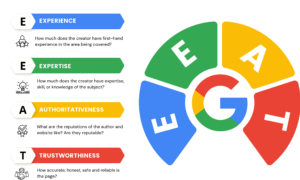
YMYL stands for ‘Your Money or Your Life‘. It’s a term used by Google in its Search Quality Evaluator Guidelines to classify a specific category of web content. YMYL content is considered to have a significant impact on the well-being, financial stability, or health of the website’s visitors. Google places a high level of scrutiny on YMYL content because inaccurate or unreliable information in these areas could harm users.
Key pillars of YMYL content include:
- Expertise: Content creators should demonstrate expertise in the relevant YMYL field. This can be done by showcasing qualifications, certifications, or experience. Collaborating with subject-matter experts is also beneficial.
- Authoritativeness: Building authority in YMYL topics involves earning recognition from peers and industry experts. Citations, mentions, and backlinks from reputable sources within the same field can enhance authoritativeness.
- Trustworthiness: Trustworthiness is built through transparent disclosure of sources, affiliations, and potential conflicts of interest. Providing clear contact information and maintaining privacy and security practices is essential.
- Credible Sources: YMYL content should rely on trustworthy, peer-reviewed sources and medical or financial institutions when applicable. Citing reputable studies, organizations, and experts reinforces credibility.
- Regular Updates: YMYL content should be kept up to date with the latest information, medical guidelines, or legal developments. Outdated information can be misleading and potentially harmful.
- Fact-Checking: Rigorous fact-checking is essential in YMYL content to ensure accuracy and reliability. Avoiding sensationalism or unsupported claims is critical.
Examples of YMYL Niches
YMYL content covers topics that are of significant importance to çeople’s lives, health, safety, or financial well-being. This category of content includes a wide range of topics such as :
1. Health and Medical Information
- Advice on medical conditions and treatments.
- Nutrition and dieting recommendations.
- Information about prescription medications and their side effects.
- Mental health advice and resources.
- Information about alternative and complementary medicine.
2. Financial and Investment Guidance
- Investment strategies and financial planning.
- Tax planning and advice.
- Retirement planning and pension information.
- Information about loans, mortgages, and credit.
- Advice on managing debt and avoiding financial scams.
3. Legal and Safety Topics:
- Legal advice and resources.
- Home and workplace safety guidelines.
- Product safety information and recalls.
- Information about personal and home security.
- Legal rights and responsibilities in various situations.
4. Major Life Events
- Buying a home or real estate.
- Parenting advice and resources.
- Marriage and relationship advice.
- Advice on planning for college and education.
- Information about job hunting and career development.
5. News and Current Events
- Information about significant global events.
- Updates on health crises, natural disasters, and emergencies.
- Political and government information.
- Economic news and analysis.
- Information about elections and voting.
6. Nutrition and Wellness
- Information about dietary plans and weight management.
- Advice on fitness and exercise routines.
- Wellness and self-care tips.
- Guidance on maintaining a healthy lifestyle.
- Information about managing specific health conditions.
7. Home Improvement and Safety
- Home renovation and DIY projects.
- Tips for home maintenance and repair.
- Fire safety and prevention.
- Childproofing and pet safety advice.
- Information about energy-efficient home upgrades.
8. Legal and Financial Resources
- Legal forms and templates.
- Budgeting and financial management tools.
- Contract templates and legal agreements.
- Tax calculators and financial planning resources.
- Financial news and market analysis.
The above examples demonstrate the diverse nature of YMYL content. Content creators in these categories should adhere to high standards of expertise, authoritativeness, and trustworthiness (E-A-T) to ensure that the information they provide is accurate, reliable, and beneficial to users. Adherence to these standards is also essential to improved search engine rankings.
Why Does Google Want Quality place a premium on YMYL Content?
The reason Google places a high emphasis on YMYL content is because the information in these areas can have a significant impact on a person’s life, health, finances, or safety. Therefore, Google aims to ensure that the content presented in search results for YMYL queries is of the highest quality, credibility, and trustworthiness.
It’s important at this point to look into the latest Google’s Search Evaluators Guidelines

When evaluating YMYL content, Google not only considers the content itself but also assesses the reputation and qualifications of the content creators or the website as a whole. This is to ensure that users are receiving reliable and safe information that can help them make informed decisions about their health, finances, and overall well-being.
The quality and reputation of the website hosting YMYL content also play a role in Google’s evaluation. Factors such as site security, mobile-friendliness, and user experience are considered. Google’s algorithms may adjust search rankings for YMYL content based on how well it meets these high standards. Websites providing reliable, trustworthy information are more likely to rank higher.
Guide for YMYL Content Creators

For content creators in the YMYL categories, it’s crucial to adhere to Google’s E-E-A-T (Experience, Expertise, Authoritativeness, Trustworthiness)guidelines. Google expects content in these areas to be backed by credible sources, written or reviewed by experts, and to provide accurate, up-to-date, and trustworthy information.
As a content creator, you must therefore invest in research, expertise, and fact-checking to maintain a high level of quality and trustworthiness. Some tips for creating high-quality YMYL content include:
- Do your research – Make sure your content is accurate and up-to-date. Cite your sources and link to other high-quality websites.
- Have experts write your content – If you have experts already working for your organization, have them write your best content. Otherwise, work to hire people who are seasoned, experienced experts in their field.
- Vet your sources – When researching your chosen topic, vet your sources. You’re getting your information from another website, but where are they getting it? If you’re interviewing someone, what makes them qualified to speak on this subject?
- Cite your sources – Always make sure you cite your sources. It can make your content more authoritative and provide a way for your readers to fact-check you.
- Avoid misinformation or misdirection – This should go without saying, but any evidence of misinformation or misleading your audience is treated harshly with YMYL content. Strive for accuracy and sincerity.
- Be thorough – Be as thoroughly descriptive as possible in your content. Cite statistics, mention counterarguments, and try to clear up possible misconceptions proactively.
- Write professionally – Again, this should be a given, but your work needs to be articulate and easy to read. If it’s full of simple mistakes or if it’s hard to process, it’s not going to rank.
- Make updates – Your content won’t remain perfectly accurate forever. As new information unfolds, it’s important to go back and update your work.
- Be transparent about your qualifications – If you are not an expert on the topic, be clear about your limitations.
- Be objective and unbiased – Avoid stating opinions as facts.
- Be respectful of your audience – Avoid using offensive or discriminatory language.
- Collect feedback and edit – It’s also a good idea to get feedback from expert peers and readers — and make edits as necessary.
Impact of YMYL Content on SEO
The end goal of any SEO strategy is to assist in creating content that Google sees as valuable and useful enough to rank high on SERPs. While content that covers YMYL topics is still subject to regular SEO principles, Google pays a little more attention to it owing to its importance.
As Google continues to place higher premiums on content that satisfies searcher intent, the impact of YMYL content on overall SEO continues being more relevant and significant. This impact extends to the broader SEO landscape in several ways:
- Algorithm Updates and Guidelines: Google’s focus on YMYL content has led to the development of more sophisticated algorithms and guidelines. Changes and updates made to cater to YMYL content often influence the way Google assesses and ranks all types of content. SEO professionals need to stay informed about these updates to adapt their strategies.
- Content Quality Expectations: The rigorous quality standards applied to YMYL content set a precedent for content quality in general. Google’s emphasis on E-A-T (Expertise, Authoritativeness, Trustworthiness) encourages content creators to produce high-quality, well-researched, and trustworthy content across all topics, not just YMYL.
- Link Building and Reputation Management: Backlinks are a fundamental element of SEO. When YMYL content earns authoritative and credible backlinks, it not only benefits those specific pages but can also enhance the overall domain authority of the website. This, in turn, can positively impact the ranking potential of non-YMYL content.
- User Trust and Engagement: High-quality YMYL content builds trust with users, which can extend to the entire website. When users trust a website’s information, they are more likely to explore other content on the site, engage with it, and stay longer. This positively affects metrics like bounce rate and dwell time, which are considered by search engines in their ranking algorithms.
- Expertise in Specific Niches: Websites that demonstrate expertise in YMYL areas also gain recognition as credible sources within their respective niches. This can lead to improved visibility and authority across the board, not just for YMYL topics.
- Comprehensive Content Strategy: Websites that incorporate high-quality YMYL content into their overall content strategy can appeal to a broader audience. For example, a financial advice website that offers reliable YMYL content can also provide general financial information that appeals to a wider audience.
Content that prioritise E-E-A-T and user-centric content strategies can benefit not only in YMYL areas but also in their overall SEO efforts. While YMYL may not be an explicit ranking factor or explain how the search algorithm works, it does provide a useful framework for understanding how to go about creating content for organic search.
Summary
The future of YMYL content is expected to continue evolving in many ways, influenced technological advancements, changing user behaviours, regulatory compliance among others. Some potential future trends may include;

- Voice Search and AI: As voice search AI tools become more common, YMYL content will need to adapt to provide concise, accurate, and contextually relevant information for voice-based queries. AI content will need to be closely monitored to ensure accuracy and ethical standards. A report by PwC on future of AI-generated content for example, proposes a joint effort between humans & AI content to address ethical, legal, creativity and trust issues.
- Regulatory Changes: Regulatory bodies may introduce new rules and guidelines related to YMYL content, particularly in sectors like healthcare, finance, and legal. Content creators and websites will need to stay informed and comply with these regulations.
- Blockchain: Emerging technologies like blockchain may play a role in verifying the accuracy and authenticity of YMYL content, especially in financial and legal contexts.
All said and done, the tenets of E-E-A-T will continue to be the foundation of online content not just YMYL content. YMYL content shall be marked by continued focus on accuracy, expertise, trustworthiness, and user-centricity. Content creators must therefore continue consistently to establish and demonstrate their expertise in the respective fields to maintain visibility in search results.
